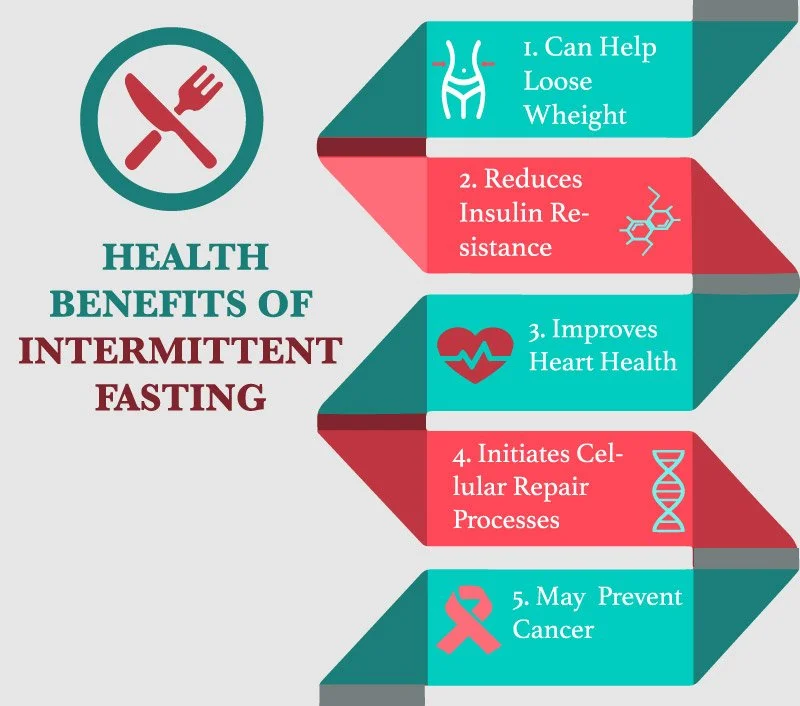Intermittent Fasting
Intermittent fasting (IF) simply means varying time schedules of eating and fasting. There are many different types of IF so it can easily be flexed to each individual’s schedule or preference.
During IF the body utilizes stored fat for energy so the practice can help people lose weight; however, the benefits of IF exceed far beyond weight loss. IF also helps lower insulin levels and improve blood sugars, so Type 2 diabetics are often able to decrease (or even discontinue) their medicine when they incorporate IF. In addition, IF may help increase the production of beneficial hormones like Human Growth Hormone (HGH) and Brain-Derived Neurotrophic Factor (BDNF). HGH is often referred to as the “anti-aging hormone” – it helps boost lean muscle mass growth while reducing body fat. BDNF functions like growth hormone for the brain - it helps the brain grow new brain cells, which can enhance memory and cognition (and may even protect against Alzheimer’s Disease). 1 IF can also help reduce systemic inflammation and oxidative stress, which ultimately results in less disease overall. Some studies suggest that IF may even confer a protective effect against cancer through autophagy 2 a process that helps the body get rid of diseased cells in the body in order to regenerate newer healthier cells.
16:8 FAST
There are many different types of IF but for starters I recommend time-restricted eating. With this form of IF you simply narrow your window of eating in a day, preferably to eight hours or less. For example, you can postpone breakfast until 10am and then finish eating dinner by 6pm so all your eating for the day is done between 10am -6pm. Or, you can skip breakfast and eat your first meal at noon (and finish eating by 8pm). You can adjust your time window based on your preferred schedule but ideally you would finish eating at least three hours before bedtime. After your body has adjusted to IF, you can narrow your eating window to six hours instead of eight for even greater health benefits.
With IF, you can still have black coffee or unsweetened tea in the morning (or anytime outside the fasting window). Though it is best to avoid calories during your fasting period, if it helps you remain complain with the IF, then you can add one tablespoon of heavy cream and a natural non-caloric sweetener like: stevia, Swerve (erythritol), Lankano (monk fruit), or Whole Earth Sweetener to your coffee or tea
5:2 FAST
Another version of IF is the 5:2 diet. With this schedule, you eat regularly for five days in a row but then restrict your intake to 500-600 calories a day on the other two days.
24 HOUR FAST
A third variation of IF is the 24 hour fast (often done one or two days a week). For example, after dinner on Monday you would not eat another meal until dinner on Tuesday (so it is 24 hours between times of eating, but you are really only missing two meals that day).
One of the benefits of IF is its’ flexibility. There is no need to fast during a special occasion because you can change up your IF schedule to fit your lifestyle. However, it is important to note, you will gain the most benefits from IF when combining the practice with a diet low in carbohydrates (sugary and starchy foods).
DISCLAIMER:
While intermittent fasting has many proven benefits, it should not be attempted by people who are underweight or have an eating disorder, those who are under the age of 18, or women who are pregnant or breastfeeding. Intermittent fasting can be dangerous in some individuals, especially diabetics on certain medications that would require dose adjustments when fasting. Before implementing any new diet or lifestyle changes, discuss them with your medical provider. Or, you can make an appointment at Kadima Center and we will be happy to individually tailor a plan to best suit your needs. Click HERE to contact us.







